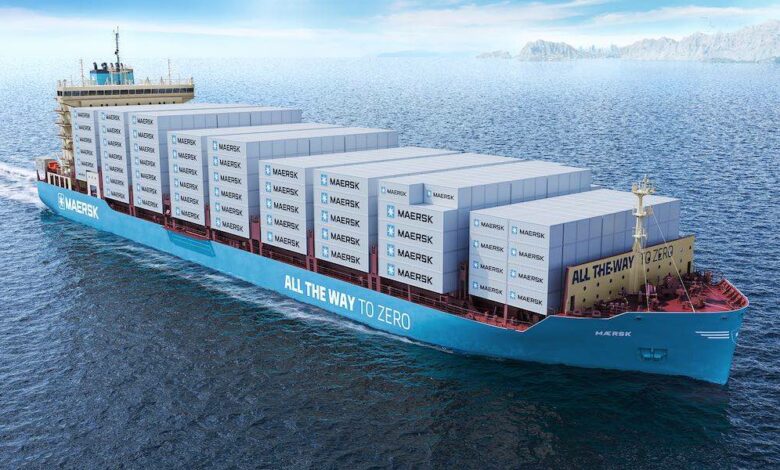Anyone got a meth lab?

Andrew Craig-Bennett ponders the difficulties of using green fuels.
A.P. Moller-Maersk seems to be going to pull off a coup. A containership is on order for its account, intended, from its dimensions, for the European feeder container trade, and able to operate in the Baltic, which is not unusual, and this ship is intended to operate on methanol as fuel, which is not unusual either. The reason I am tipping my metaphorical hat to Maersk is that they have been making no secret of their involvement in a consortium of Danish shipowners who are setting up to manufacture green methanol. The ship that Maersk is building is, I think, intended to operate on a ‘zero carbon’ basis, by running on green methanol, that is to say, on methanol that is produced without adding at all to the carbon dioxide, carbon monoxide and methane in the atmosphere.
The only merchant and warships able to do move from A to B without adding to the greenhouse gases in the atmosphere are either sailing ships or nuclear ships, and perhaps, depending on where the electricity to charge their batteries is coming from, some coastal trading battery electric ships.
Maersk’s ship is about to do it too, if its methanol fuel is truly green, and I suspect that Maersk will do its very considerable best to ensure that the methanol its ship uses is not only green but is very publicly known to be green, because the cost of green fuel is going to be much higher than the so-called blue stuff, made in ways that do add to greenhouse gases, and Maersk will be spending a lot of money to be green in the sight of all and sundry.
I predict that Maersk, having built its green, zero carbon ship, will announce its entry into service, and its ability to “carry cargo carbon-free”, with a roll of drums fit to be heard around the world. The company will, after all, have to get its money back. In the Baltic, where environmental regulations make it practical to try to do so. Elsewhere, not so much.
I don’t think the whole of the Maersk fleet of ships will be carbon free, any more than other ships being built for other owners will be, for many years to come.
Plenty of ships are being built with the ability, according to their owners, to operate on methanol, or ammonia, and a few are being built to run on batteries, or hydrogen, and when their owners say this, they usually mean two things.
First, they mean that the ships will be dual-fuel, meaning that their prime movers are able to operate on both heavy fuel oil and on methanol or whatever, which isn’t actually very hard to do, and their ships will have been designed with space to add fuel tanks for whichever new fuel is fancied – and methanol and ammonia are all just ways of getting hydrogen to where you want to burn it – and this in turn means that a dual-fuel ship will need three times the tank capacity, because the energy density of these fuels is half that of HFO, so a ship that just runs on heavy fuel oil will need a third of the tank space. These fine vessels won’t be able to run on the CH4, or the CH3OH, or the NH3, unless they are fitted with the tanks and fuel handling systems for it, which, at he moment, they have not got, because of the space wasted. Dual-fuel means HFO as usual, but it looks good.
Second, the owners of these ships are confident they will be to muddle through the difference between green CH4, NH3 or CH3OH and the planet-destroying sort, which gets called blue or grey.
The thing that I am leading up to here is that, as I wrote in this column a bit ago, all crude oils and all residual fuels oils made from them can be identified and traced, but we have vast amounts of shonky oil floating round the oceans of the world at the moment.
This being the case, how much grey and blue CH4, CH3OH or NH3 – all very simple and therefore untraceable compounds – is going to be passed off as the far more expensive green CH4, NH3 or CH3OH in the years to come? This is going to be much the easiest way to make money in shipping.
We know what our industry is like. But is there any real effort being put into setting up systems to stop cheap and planet-destroying fuels being passed off as the expensive and planet-preserving stuff?
At least Maersk have given themselves a reason to prove their honesty in the Baltic. Pity about everyone and everywhere else.

I think that you’ve captured the key issue- if charterers (or “beneficial cargo owners” in liner parlance) will pay, then all the outsized expenses can be recouped. At a time that data providers, optimizers and visibility providers in the maritime space are now consolidating, I am particularly interested in how the “paying for green” mechani$m$ will actually work, and whether some transparency will surround their mechanics.
So am I, Barry!
Watch this space!
Wonderfully put. If Maersk can show this can be done, other big players have to follow. Short sea shipping is the ideal starting block for this change.